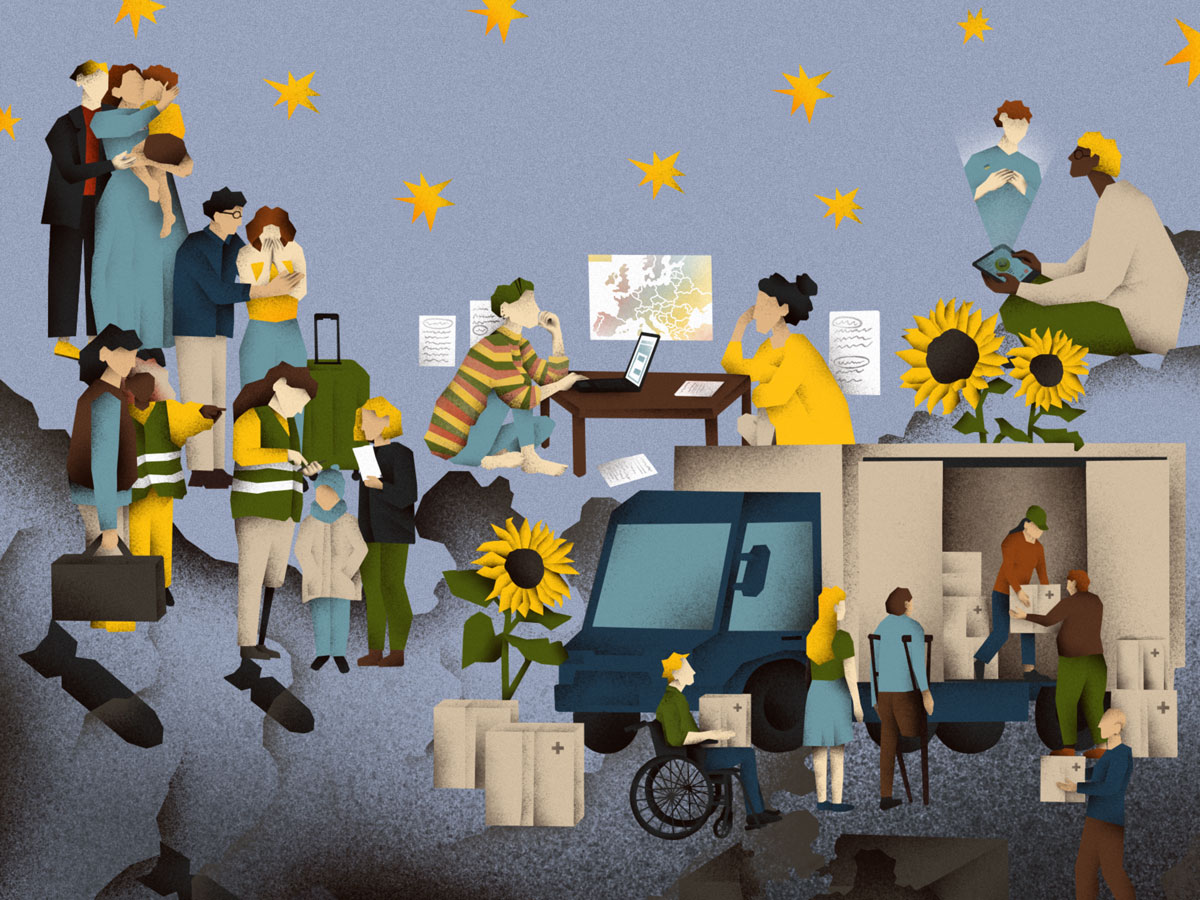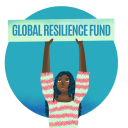This article is part of a longer publication on the brutal impacts of Russia’s full-scale assault on Ukraine. It has been written by the Global Resilience Fund, a collaborative fund for girls and young feminists in humanitarian crises. The Global Resilience Fund is part of Purposeful’s portfolio of Funds to resource the resistance of girls and young feminists across countries, issues and contexts.

Illustrations by Liza Yablonska-Mykhailus.
Today marks one year since Russia’s full-scale invasion of Ukraine, a war that has created the largest humanitarian crisis in Europe since WWII. The painful and devastating impact of the war has already amounted to over 18,000 deaths, the displacement of millions, and destruction of over 50 per cent of the country’s energy infrastructure. The toll of devastation, humanitarian crises, and war crimes – including sharply increasing sexual violence that has already impacted girls and women from the age of 4 to 80 – is expected to be far worse than currently documented and continues to affect every single part of Ukrainians’ lives.
Girls and young feminist activists, especially disability rights activists, LGBTQIA+ activists, migrants, and others living at the intersections of marginalised identities, are experiencing both the war and the complexities of displacement in very real ways. Routes out of Ukraine are more dangerous and host countries, through oppressive policies and measures, are not providing refuge. In addition, there are networks of refugees displaced from other conflicts in the region who settled in Ukraine for whom isolation and marginalisation has been further compounded by this new crisis.
‘The war is making poverty, inequalities, and absence of appropriate social assistance on a national level more of a problem than it was before. They may not seem feminist issues but in fact they are. Those who hugely suffer from such circumstances are women existing in a constant state of vulnerability’ – Ivanka, Yana, Zhenya and Tanya of Bilkis
Girls and young feminists on the frontlines, yet invisibilised and under-resourced
Despite being disproportionately impacted by the war, girls and young feminists are leading frontline response efforts in Ukraine – reaching and supporting the needs that the international humanitarian sector, which has received the lion’s share of the funding for Ukraine response efforts, is often failing to reach.
Girls and young feminists are providing direct emergency evacuation and relocation support; mental, emotional, and physical care services, accompaniment; and food, shelter, and medicine. As Anastasia of Feminist Lodge shares: ‘Our main priority is humanitarian aid, and we have two main approaches to this work. Our first approach: we use our activist, feminist network in different cities to find ways to send help to the occupied and frontline territories. We have already sent large batches of medications, hygiene products, and baby food to Kherson, Berdyansk, and Zaporizhzhia region, most of which is occupied, to the frontline cities like Kramatorsk. We find the right people and build this logistical supply network. There are studies that show that the vast majority of humanitarian aid in Ukraine is distributed by the efforts of civil society. We also noticed that at the beginning, we simply did it, and didn’t state that our aid is feminist humanitarian aid.’
As the Urgent Action Fund shares: ‘There is an astounding difference between who is doing the work and who is receiving the funding for the Ukraine humanitarian response. [Thus,] what matters is not necessarily what we fund, but who and how we fund.’ Yosh of Feminist Workshop adds: ‘Support of Ukrainian civil society is not only money, it is visibility and recognition of the work being done.’
Resourcing girls and young feminists in Ukraine
Within hours of the full-scale invasion, our grantee partners in Ukraine reached out asking for support, and activist advisors proposed ways to reach groups and move to action to ensure we were in timely solidarity with girls and young feminists in the region. Over the last year, we have moved flexible resources to 25 collectives of girls and young feminist activists and partnered with other justice funders to move money on their behalf, resourcing many more groups in the process. We have co-convened dialogues between funders and activists, accompanied groups as they’ve navigated the realities of this moment, and grappled with what it means to facilitate participatory decision-making processes in the midst of war.
We have moved as part of a small network of peer funders including women and feminist funders, children’s rights funders, and human rights funders, stepped into action to mobilise and move flexible resources to grassroots efforts led by girls, women, trans and non-binary groups and organisations. Funders and organisations made concerted efforts to organise themselves and reduce the burden for activists, with new coordination mechanisms being set up.
Below are key insights from some of these funders who have directly resourced girl and young feminist-led efforts in response to the war.
- ‘This is our message for other donors – invest in solidarity within the movement, and support the young generation of leaders, because this is how the feminist future should look like!’ Ukrainian Women’s Fund
- ‘A year after the initial invasion, many Ukrainians youth activists are running out of resources and energy. They are exhausted from constantly working to help their friends and families and communities. This is not the time for donors and supporters to decrease their attention and resources.’ Joseph of Global Fund for Children
- ‘Our call for funders is to listen to local organisers and responders, follow the lead of women, girls, gender non-conforming people and give as much unrestricted long-term funding as possible.’ Sandra of Global Fund for Women
- ‘Urgent Action Fund was uniquely positioned to support those on the frontlines due to our rapid response grantmaking model and existing network in the region. Our greatest strength is our deep, trust-based relationships with local activist movements.’ Urgent Action Fund for WHR
Solidarity requires action
As funders in solidarity with girls and young feminist activists and movements in Ukraine, we share these key recommendations:
- Ensure sustained, flexible, and responsive funding for grassroots response efforts in Ukraine, especially those led by girls and young activists.
- Recognise and create space for Ukrainian girls and young activists to describe, lead, and shape the decisions that impact their lives.
- Ensure deeper collaboration, dialogue, and accountability between funders and activists, in ways that are non-extractive and minimise emotional labour for activists.
- Sitting in the complexities of war and peace, make space for uncomfortable truths, debate, and dialogue as the basis of solidarity.
- Fund in a way that actively contributes to decolonising humanitarian aid.
- Practise solidarity and disrupt the systems of oppression that render some lives and crises under-resourced and undervalued.
The intersection and interconnection of war and crises
Young activists are experiencing the Ukraine war in complex and multi-layered ways across borders. Crisis is an ever-present reality for so many around the world. Rooted in radical feminist solidarity and understanding, the importance of dismantling systemic injustices within the humanitarian sector and emergency response efforts, we must refuse to isolate and ignore the brutal crises impacting communities across the world – both the crises that are capturing headlines and the ones ignored.
This means resourcing the interconnection and intersection of crises and systemic Injustices. It also means continuing to fund in Ukraine, and resourcing girl and young feminist-led groups and organisations across humanitarian contexts in some of the world’s most forgotten crises, including in Occupied Palestine and across the African continent.
Towards a political feminist peace
‘As feminists, moving away from the binary of war and peace towards living in safety, dignity, and freedom means being intentional and willing to unpack the uncomfortable truth of naming things as they are and demanding more serious accountability. Within our various identities, we need to recognise the dynamics and manifestations of the multi-layered oppression against young people and girls affected by wars and crises, which is explicitly demonstrated in our political responses to these crises. Our work as feminists will always be incomplete if we focus only on resourcing those affected by war. Ultimately, true solidarity and accountability must also be directed towards a feminist political peace.’ Sandie Hanna, Purposeful, Occupied Palestine.
Read the full publication with in-depth reflections from young feminist activists and feminist funders responding to the war in Ukraine.
The following are authors and contributors to the full publication: Anatasia Chebotaryova, Feminist Lodge; Anastasiia Yeva Domani, Cohort; Angelika Arutyunova, Feminist justice consultant; Alena Pilipyuk, Charitable Organization Positive Women of Khmelnytskyi; Boikanyo Modungwa, Purposeful; Iryna Musii, Women UA; Iryna, Young Feminists of Odesa city; Ivanka, Bilkis; Jen Bokoff, Disability Rights Fund; Joseph Bednarek, Global Fund for Children; Laura Vergara, Purposeful (Global Resilience Fund); Masha, ReSew; Rosa Bransky, Purposeful; Ruby Johnson, Purposeful (Global Resilience Fund); Sandra Macias del Villar, Global Fund for Women; Sandie Hanna, Purposeful; Tanya, Bilkis; Tana Forrest, Purposeful; Ukrainian Women’s Fund; Urgent Action Fund for Women’s Human Rights; Yana, Bilkis; Yosh Pshyk, Feminist Workshop; and Zhenya, Bilkis.






Comments (0)